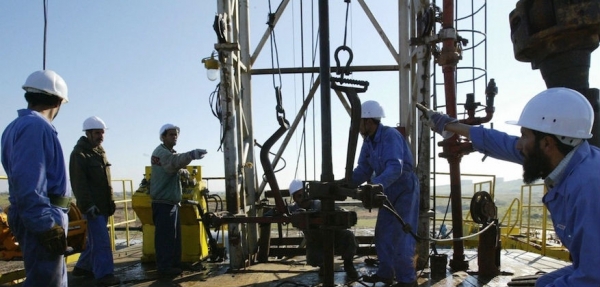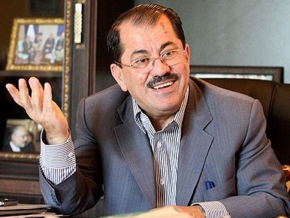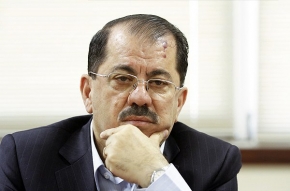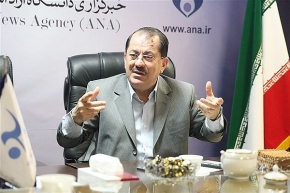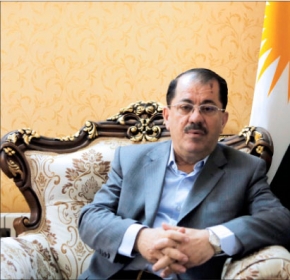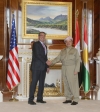KRG ready to assist Turkey and PKK to resume peace process talks
Erbil, Kurdistan Region, Iraq (cabinet.gov.krd) - Kurdistan Region Prime Minister, Nechirvan Barzani, yesterday received a delegation from People’s Democratic Party, HDP, led by Turkish parliament member, Osman Baydemir, and several representatives of the party in Kurdistan Region and Turkey.
The members of the delegation expressed their condolences to the government and the people of Kurdistan Region on the killing of a number of civilians in last week’s Turkish air attack on Zargali village in the Kurdistan Region.
The delegation visited the Region in order to investigate the incidence.
The members of the delegation also shed light on the situation of the Kurdish people in the region in general, describing it as fragile and necessitates cooperation among all the political sides and protect the unity of rank in the face of the challenges ahead for the region in general and the Kurdistan people in particular.
The two sides also discussed the peace process in Turkey and the recent confrontations between Turkey and Kurdistan Workers Party, PKK. They stressed that the current tension cannot be solved militarily, but only through peaceful means.
In this regard, Prime Minister Barzani reaffirmed that the Kurdistan Regional Government, KRG, is ready to play its role in helping to revive the peace process in Turkey and resume negotiations between the two sides.
Regarding the civilian casualties in the recent confrontation between Turkey and PKK, Prime Minister Barzani said that PKK guerrillas should move away from villages and populated areas, and Turkey also must not target civilians in search for PKK guerrillas.
He pointed out that large numbers of civilian population have abandoned their villages in the border areas for fear of possible bombardments.
Prime Minister Barzani reaffirmed that the current tension cannot be solved militarily, calling on both sides to return to the negotiation table.
July report - KRG continues direct oil sales to overcome budget shortfall
Erbil, Kurdistan Region, Iraq (cabinet.gov.krd) – Oil exports from the Kurdistan Region dropped during July due to sabotage of the pipeline through Turkey.
According to the monthly Kurdistan Regional Government, KRG, oil export report for July, 16,019,090 barrels of crude oil (average 516,745 bpd) were exported through the pipeline through Turkey. This is a 6.5 per cent decline over June when the KRG exported 17,130,639 barrels (average 571,021 bpd).
In an earlier statement, the KRG Ministry of Natural Resources said that since 27 July “there have been sabotage attacks and attempted thefts on the pipelines that carry crude oil from the Kurdistan Region to Ceyhan in Turkey”. According to the monthly export report, stoppage occurred “in the flow of crude oil to Ceyhan for 111 hours”.
Of the total amount of oil exported in July, fields operated by the KRG supplied 12,020,683 barrels (average 387,764 bpd) while fields operated by the North Oil Company (NOC) supplied 3,998,407 barrels (average 128,981 bpd).
Iraq’s State Oil Marketing Company, SOMO, in Ceyhan received 2,201,540 barrels (average 71,017 bpd). The KRG intended to deliver to SOMO a further two million barrels at the end of July, but was unable to do so due to the pipeline interruption.
According to the report, the KRG continued its direct oil sales in Ceyhan in July in order to compensate the Region for the budget shortfalls from the federal government and to pay debts incurred during 2014.
The KRG has, however, announced it will continue to work with its counterparts in the federal government to reach a resolution on all outstanding oil and gas issues per the joint statement of June 17, 2015 by the KRG’s Regional Council for Oil and Gas Affairs and the five political parties in the Kurdistan Regional Government.
Earlier this week, the KRG Ministry of Natural Resources announced that from September 2015 onwards, the KRG will on a monthly basis allocate a portion of the revenue from its direct crude oil sales to the producing international oil companies, IOCs. Further, with exports anticipated to increase in early 2016, the KRG envisages making additional revenue available. This is important for IOCs to maintain and increase production levels.
Nazem Dabbagh in Talk with Rouzan Press: ISIS Uses even Haze to Penetrate
Concerning the recent changes in Iraq ISIS’s strike to Al-Ramadi of Iraq in especial, Rouzan Press had an interview with Nazem Dabbagh of which the important outline as follow:
Relating to the reason why ISIS’s news is less being heard in Kurdistan Region of Iraq these days asked Rouzan Press. He replied that ISIS has found that through courageous resistance of Kurds in Iraq and Syria that taking Kurdish towns are unlikely; thus he has started to focus on two Sunni ones, especially in two fronts of Ramadi and Syria. While terrorists have attack the villages bordered with Kurdistan Region daily, continuously looking for an opportunity to penetrate our Region. He went on that presently there has been a complete coordinate in different points of Kurdistan to confront with ISIS’s strikes or penetration, since it is essential not discard their threats at any conditions. Experience has proved that ISIS does take advantage of any chances, particularly in special conditions like climate changes even haze to attack. The reporter of Rouzan Press mentioned the being killed of a Iranian kurd called Amir Ghobadi in Kubane and asked Dabbagh what other nations accompany you, he replied: there is no absolute information for this, but youths from Swede, America, Netherland and other countries have arrived in Kurdistan and along with us fight against ISIS.
Etemad Press’s Talk with Nazem Dabbagh: Ramadi will be Released, but to Protect it Requires Unity
After the victories of the army in Salaheddin and the liberation of Tikrit, Al-Ebadi’s government decided to cross out people forces in release operation of Al-Anbar give their role to fresh forces. Thus ISIS could occupy this town, what caused Al-Ebadi called for people help once more.
Relating to this Maytham Soleimani the Etemad Press’s reporter had an interview with Nazem Dabbagh the representative of Kurdistan Region Government of Iraq in Tehran as follows:
In Mr. Dabbagh’s view the gained victories against ISIS was for all different groups’ participation of Iraq. However, after these victories some began to wage tribal wars against each other to gain all the advantage for themselves so that the government had to omit some groups. These differences were all benefits to ISIS. Once more the government trusted only in police and army and it left the security gained in Al-Anbar for them. It was how the experience of Mosul repeated in Ramadi. Now conditions have arisen in which Iraq have to think uniquely.
Relating the refugees of Ramadi including 25000 people he said: we must diminish the reason for their being homelessness. One of the reasons is the disruption existing in Iraq in which the army’s weapons have been taken by ISIS; America which has been paid millions of dollars by Iraq, now sending its fighters to destroy them and the government has to purchase these weapons again. In Dabbagh’s view these dollars should have paid for infrastructures and services for people, it might not has created an ISIS. Shias under a unit authority, Ayatollah Sistani, stand under one flag despite of differences as the Sunnis do not.
Nazem Dabbagh Talks with Ana News Agency: Arms Help of America to Pishmerga is conditioned/ Pishmerga should be considered a part of defensive system of Iraq
Nazem Dabbagh the representative of Kurdistan Region will not welcome arms establishment, but the strength of Pishmerga according to defensive system of Iraq.
In talk with the international reporter of Ana news agency concerning Kurdistan Region’s position against American Congress’s plan based on arming Pishmerga and Sunni tribes of Iraq opposed by national officials and organizations of the country including the Prime Minister and Parliament and described it as a plan to separate Iraq, Nazem Dabbagh Said: the Region will welcome this matter and plan.
He added: Iraq has to always be Iraq and have an equal look at all groups especially at Pishmerga. He continued: the Region is getting into a daily fight with ISIS and it was the only area relying upon Pishmerga which released areas occupied by ISIS.
Dabbagh said: According to the Constitution of Iraq, today Pishmerga has to be a part of the defensive system of the country, namely, all military financial and consultative help being delivered to Iraq have to be assigned to Pishmerga as well.
Mentioning the recent plan of America Congress he said: this military help and arming Kurdish and Sunni forces are according to the Constitution of Iraq. Of course this plan and military help to Pishmerga are conditioned.
About explaining of Congress plan he added: if Iraqi government does not give a part of delivered aids to Pishmerga, Americans will do this directly and we welcome this plan. However before America’s direct help we accept Iraq government considers all rights of Pishmerga according to the Constitution.
The representative of Kurdistan Region in Iran stated: Pishmerga are strong forces and protect the borders of the Region, so it has to be deemed as the defense system of Iraq.
He said: the Congress plan mentioned these concerns and made its military aids conditional upon that if central government of Iraq does not put Pishmerga in its defense-military filed, the USA will give these aids to them.
In a response to question whether this plan tends to separate Iraq or not Dabbagh said: if central government follows the Constitiute, it will help to strength Iraq; whereas Pishmerga needs foreign helps to fight against Terrorists.
He insisted: Kurdistan Region does not welcome the establishment but strength Pishmerga according to defense system of Iraq.
About the possibility of Iran opposition to this plan he added: I do insist the aids of this plan are conditioned and if Iraqi government is obedient to the Constitution, there will be no need to the USA direct help to Pishmerga.
He stated: Iran delivered military consultative aids to KRG, so Iraq government also ought to perform its duty.
Finally the representative of KRG in Tehran said: the being conditional of the USA’s plans has to be considered specially. Unfortunately it has not been yet.
Nazem Dabbagh Talks with Ghanun Press: after Iran and the West’s Agreement, the Spring of the Middle East will Begin
The growth of terrorist groups in the Middle East has caused new blocking in the region, to study this matter, Mahdi Elyasi, the Ghanun Press Reporter, had a talk with Nazem Dabbagh, the representative of KRG, of which the main points as followed:
Mr. Dabbagh knows ISIS as an obvious instance of terrorist group without government in the Middle East. In his view ISIS has not been given birth today, in spite of being about to be weakened, it will not be vanished; even if it vanishes, other groups with such features and with Salafi attitude will substitute for it. Dabbagh believes this concern has caused security matters to change to the most important priorities of the governments in the region. In his opinion the growth of terrorist has been created in the atmosphere of government’s weakness, whereas security affairs are not controlled by a definite organization. He continued that they along with their friends could release 95% of occupied areas.
In a response to a question Dabbagh said following the events happened in the region, not only Arabian spring was not created but also winter happened instead. He added that if ISIS gets defeated, it will come to power somewhere else. Dabbagh replied to a question that the same position, the lack of a united and concentrated leadership over affairs, also exist in Kurdistan as in other countries.
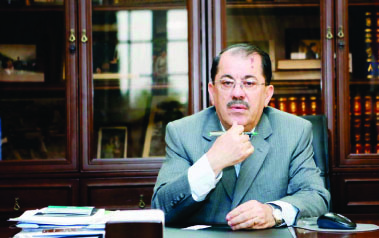
Relating the necessity of forming a military unity against terrorist groups, Dabbagh said: the events in the region will not take place merely in a geographical area, in addition it should be studied what effects it may have in the future. Unfortunately today we see that when a security problem happens to a country of the region, the neighbors think they have been the winner in their policies. They do not guess if a terrorist group wins in country, what will happen next.
In my view the condition after Iran and the West agreement will change greatly that can be changed to a real spring to establish security and welfare in region.
In a reply to an important question concerning the condition of Kurdistan Region in regional alliances, Dabbagh said: in the region there are four powers Iran, Turkey, Saudi Arabia, Israel, therefore, blocs in the region have formed around Shia Iran and its opposition Turkey-Arabia. Kurdistan Region’s policy of Iraq in this condition is firstly to preserve its benefits according to the Constitutes of Iraq, that is, our policy should be somehow agreed with the policy of central government of Iraq. Secondly according to Kurds the benefit is to establish security and welfare around them.
On the subjects of Iran and Turkey’s relations in spite of regional competence, of Iran and six powers’ nuclear agreement and of the Kurdish security concern in Iran and Turkey Dabbagh declared that: During the history of Kurdish movement in Iraq, we have been looking for and spreading our rights. We have taken this policy to other Kurds of the region. We have not taken any measure against Kurds of other countries; furthermore we will not support other Kurdish groups’ actions against regional countries. That is why that we have and will not allow both sides to use our land against each other. By this policy we have been able to keep welfare of our border with Iran, Turkey and Syria.
Concerning the positions of KRG of Iraq relating Turkish government and Kurds negotiations Dabbagh said that KRG of Iraq will support any approach leading to peace and agreement, if there is no so, it tries to create, since peace is beneficial to Kurds.
KRG Council of Ministers strongly condemns PKK’s attack on the Kurdistan Region oil pipeline
Erbil, Kurdistan Region, Iraq (cabinet.gov.krd) - In a statement, the Presidency of the Kurdistan Region Council of Ministers, strongly condemned the bombattack on the Kurdistan Region oil pipeline by the Kurdistan Workers' Party, PKK, and considered it as an attack on the source of livelihood of the Kurdistan Region people.
Following is the text of the statement:
We condemn PKK’s attack on the source of living of the people of Kurdistan Region
The pipeline, which is used by the Kurdistan Region to export its oil, was bombed on 29 July 2015 in Sirnak province inside the Turkish border. PKK’s armed wing, People’s Protection Force, HPG, the following day officially claimed responsibility for the blast.
The Government and the people of Kurdistan Region currently pass through severe financial difficulties, due to withholding Kurdistan Region’s budget by the Federal Government of Iraq and the war against the Islamic State terrorist organisation, ISIS.
This oil pipeline constitutes the only principal source enabling the Kurdistan Regional Government, KRG, to pay people’s salary and helping the government and people of the Kurdistan Region to resist all the pressures and challenges the Region is currently facing. It is also the main source of funding Peshmerga Forces in the fight against ISIS, as well as the source of KRG assistance to more than 1.8 million refugees and internally displaced persons, who fled to the Kurdistan Region.
We strongly condemn this attack by the PKK, and consider it an irresponsible act against the people of the Kurdistan Region, the resistance of the Peshmerga forces and the refugees and displaced persons.
We consider that this attack has no other objective, except targeting and undermining Kurdistan Region’s economy and the living source of its citizens.
This is a condemnable act by the Kurdistan people and parties. We call on the PKK to stop the recurrence of such hostile acts against the people of Kurdistan Region.
The Kurdistan Regional Government seeks to use the pipeline of the Iraqi Oil Marketing Company, SOMO, in order to be able to continue exporting its oil.
Presidency of the Kurdistan Region Council of Ministers
31 July 2015
The United Kingdom supports settlement of differences between Erbil and Baghdad
Erbil, Kurdistan Region, Iraq (cabinet.gov.krg) - Kurdistan Region Prime Minister, Nechirvan Barzani, yesterday received Ambassador Frank Baker, United Kingdom ambassador to Iraq and his accompanying delegation.
Ambassador Baker highlighted bilateral relations between Kurdistan Region and United Kingdom in all the fields, particularly the commercial and economic areas.
The two sides discussed the situation in Iraq in general and the fight against the Islamic State terrorist organisation, ISIS, in particular.
Ambassador Baker reiterated UK support for the Peshmerga Forces in the war against terrorism, praising their role and that of the people and government of Kurdistan Region in confronting and repulsing the terrorist threat.
He also pointed to the differences between Kurdistan Region and Iraqi Federal Government, as well as the Region’s internal issues, particularly the Kurdistan Region Presidency Law, stressing the need for solving those issues through dialog, common understanding, and consensus.
Ambassador Baker expressed his support and collaboration for the settlement of these issues.
Prime Minister Barzani thanked the UK delegation for the visit, expressing his hope that bilateral relations between Kurdistan Region and United Kingdom will witness further development in all the fields.
He highlighted the continuous victories marked by the Peshmerga Forces in the war against ISIS. Meantime, he called for further military aid for Peshmerga forces from European countries, particularly the United Kingdom.
Regarding the differences with the Iraqi Federal Government, Prime Minister Barzani reiterated that Kurdistan Regional Government aims to solve the issues through dialog and negotiations.
Regarding the issue of the Kurdistan Region Presidency Law, he reiterated that it should be settled on the basis of consensus and mutual understanding, and that all the political sides should reach an outcome that is in the general interests of the Kurdistan Region.
Zagreb witnesses a series of cultural and political events on Kurdistan Region
Zagreb, Croatia (dfr.gov.krd/cabinet.gov.krd) - The Croatian capital, Zagreb, last week witnessed a series of cultural events on Kurdistan Region and political meetings between Kurdistan Regional Government, KRG, and Croatian senior officials.
A delegation from KRG Department of Foreign Relations, headed by Minister Falah Mustafa, Head of the Department, took part at the 49th International Folklore Festival, which took place in Zagreb between 15 and 19 July 2015. At the sideline of the Zagreb Folklore Festival, the Kurdish-Croatian cultural week was held.
On Sunday, 19 July 2015, Minister Mustafa attended the final ceremony of Zagreb International Festival where the Kurdistan national team for traditional art performed Kurdish folklore dance.
Commenting on the importance of the Kurdish-Croatian cultural week, Mr. Mustafa stressed that “The event provided a good opportunity for participants to experience authentic culture and heritage of Kurdistan. Such events can further promote cultural exchanges and enhance mutual understanding between the people of Kurdistan and the people of Croatia.”
The following day, Mr. Mustafa participated in a seminar and photo exhibition on Anfal at the Croatian National Archive. He said, “Every civilisation, every culture, every people has a defining time in their history. For the Kurds of Iraq, that time was the Anfal. It was the time when we faced death at hands of a determined enemy inside our own country, but survived to prosper.”
During his visit to Croatia, Minister Falah Mustafa also held meetings with senior officials including the President of the Republic of Croatia, Ms Kolinda Grabar-Kitarović.
At the meeting with Croatian President, Mr. Mustafa discussed bilateral ties between Kurdistan Region and Croatia as well as the current situation in the region.
They discussed the military and humanitarian difficulties facing the Kurdistan Region and stressed the necessity of regional and international cooperation to eradicate international terrorism and to restore stability in the Middle East.
Mr. Mustafa expressed his gratitude for Croatia’s contribution to the Counter-ISIS Coalition and noted that Peshmerga forces are still in need of weapons, ammunition and military training.
The Minister also referred to the challenges facing KRG in caring for close to 1.8 million refugees and internally displaced people, IDPs, and called for further international support.
President Kitarović stated that Croatia understands the difficulties facing the Kurdistan Region and reiterated Croatia’s commitment to continue supporting Kurdistan Region in the fight against the Islamic State terrorist organisation, ISIS.
KRG Head of Foreign Relations was also received by Chief of staff of the President of Republic of Croatia, defence and national security and foreign policy advisors to the President.
Mr. Domagoj Juricic, Chief of staff to the Croatian president, commended the role of Peshmerga forces in stopping the advance of ISIS and valued the KRG’s humanitarian response to the influx of refugees and IDPs to the Kurdistan Region.
He said, “We consider the Kurdistan Region as a partner, we are determined to further broaden our ties and to continue our cooperation in various fields.”
In his meeting with Mr. Mustafa, Mr. Dario Mibelin, foreign policy advisor to the President of Croatia said, “We appreciate the efforts of President Masoud Barzani in leading the Kurdistan Region in the fight against ISIS terrorists. Kurdistan Region has been an island of stability, religious tolerance, peaceful coexistence and prosperity.”
Mr. Josip Buljevic, defence and national security advisor to the president stressed that, “Religious extremism is an international phenomenon; therefore the international community has a shared responsibility to fight international terrorist groups. Croatia, as a member of the Counter ISIS Coalition is committed to continue supporting the Kurdistan Region in this fight.”
EU Continues its support for Kurdistan Region
Erbil, Kurdistan Region, Iraq (cabinet.gov.krd) - Kurdistan Region Prime Minister, Nechirvan Barzani, yesterday received European Union Commissioner for Humanitarian Aid and Crisis Management, Christos Stylianides, EU ambassador to Iraq Jana Hybaskova, and their accompanying delegation.
The EU officials expressed their appreciation to the people and government of Kurdistan Region, which has accommodated and offered assistance to a large number of refugees and internally displaced people, IDP’s, despite the Region's financial difficulties.
They reiterated their support and assistance to the Kurdistan Region, stressing that they will work for increasing international assistance in order to help easing the Region's financial burden.
In a post on his twitter account, Mr. Christos Stylianides said, “We're committed to support impressive generosity of KRG to IDPs and refugees”.
In the meeting with the Prime Minister, the EU delegation also hailed the role of the Peshmerga forces that have been able to repulse Islamic State terrorist organization, ISIS, forces, and protect the region's population from various religious and ethnic backgrounds.
Prime Minister Barzani thanked the EU officials for their visit, and demanded that they covey the reality of situation in the Region to the related European and international organizations. He called for further assistance to the refugees and IDPs, directly or through the international and local aid agencies.
He praised Ambassador Hybaskova’s role, who frequently visits Kurdistan Region and closely observers the situation on the ground, saying this demonstrates the importance that the European Union accords to the Kurdistan Region.
The two sides also discussed the recent developments in Iraq and the region in general.
More...
President Barzani Meets with Italy's Defense Minister
Latest News
- President Nechirvan Barzani's New Year Message
- New year message from Prime Minister Masrour Barzani
- President Nechirvan Barzani welcomes the New Consul General of Iran
- President Nechirvan Barzani meets with Dutch Defence Minister Ruben Brekelmans
- President Nechirvan Barzani meets İsmail Beşikçi
- President Nechirvan Barzani meets Italian Defense Minister Guido Crosetto
- Nechirvan Barzani: The flag of Kurdistan symbolizes our shared values
- President Nechirvan Barzani meets Commander of Coalition Forces
- President Nechirvan Barzani welcomes new Ambassador of the Czech Republic
- President Nechirvan Barzani meets with Admiral Sir Tony Radakin, UK Chief of Defense Staff
- President Nechirvan Barzani meets with German Defense Minister Boris Pistorius
- President Nechirvan Barzani attends ceremony for the reopening of Notre-Dame Cathedral
- President Nechirvan Barzani bids farewell to the departing Italian Consul General
- President Nechirvan Barzani receives the new Ambassador of the United Arab Emirates
- President Nechirvan Barzani receives the new Ambassador of Italy
- President Nechirvan Barzani meets with the Russian Ambassador to Iraq
- Nechirvan Barzani Commemorates the late Professor Mustafa Zalmi as a Beacon of Reform in Islamic Theology and Jurisprudence
- Nechirvan Barzani attends the 10th Anniversary of the American University of Kurdistan
- President Nechirvan Barzani bids farewell to departing US Ambassador
- President Nechirvan Barzani Meets with UK Home Secretary Yvette Cooper
- President Nechirvan Barzani in Vienna: Austria aims to enhance diplomatic and trade relations
- Kurdistan Region President meets with President of Austria
- President Nechirvan Barzani meets with Foreign Minister of Austria
- President Erdoğan reaffirms Türkiye’s continued support for Iraq and the Kurdistan Region
- President Nechirvan Barzani’s message on the 126th anniversary of Kurdish journalism
- President Nechirvan Barzani at the Sulaimani Forum: The country must bring us all together
- President Nechirvan Barzani meets with European Union Ambassador
- President Nechirvan Barzani receives French Ambassador
- President Nechirvan Barzani visits Iranian Consulate General to pay respects to victims of Kerman terrorist attack
- President Nechirvan Barzani receives outgoing French Ambassador

